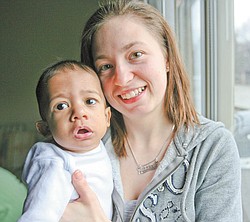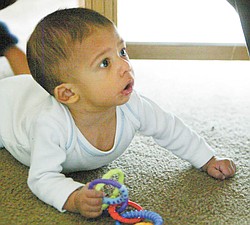HEARTFELT JOY
By WILLIAM K. ALCORN
alcorn@vindy.com
STRUTHERS
Little Caleb Machel is in that happy-baby babbling, gurgling stage — clearly pleased with the sounds he makes.
Caleb Machel is not too certain about the camera pointed his way, but his mother, Ashley Machel of Struthers, is all smiles. Caleb, nearly 8 months, appears to be fully recovered from lifesaving open-heart surgery performed when he was 6 days old.
Caleb is on the verge of crawling.
He rolls over with ease.
He rocks back and forth on his hands and knees, on the verge of crawling for the first time.
His mom, Ashley Machel, and grandmother, Loretta Machel, smile.
All is as it should be.
But when Caleb, who will turn 8 months old Easter Sunday, entered the world Aug. 4, 2009, the situation was anything but normal.
During the seventh month of Ashley’s pregnancy, a sonogram revealed that the major arteries to Caleb’s heart had not developed properly. A sonogram, or ultrasound examination, uses high-frequency sound waves to scan a woman’s abdomen.
Caleb was diagnosed with truncus arteriosus, defined on the Mayo Clinic Web site as a “congenital heart disease characterized by a single blood vessel arising from the right and left ventricles, instead of the normal two.”
In laymen’s terms, Caleb’s aorta and pulmonary artery weren’t divided as they should have been. His pulmonary artery, which should take deoxygenated blood from the right side of the heart to the lungs to be oxygenated, was instead attached to his aorta. The aorta is the main artery that takes oxygen-rich blood from the left side of the heart to various parts of the body.
Surgery is the treatment.
The key to successful treatment is pre-birth diagnosis, which allows a special team to be on hand at birth to monitor the baby and immediately perform surgery if necessary. Minutes are crucial, said Dr. Sayed El-Azeem, a local consultant for high-risk pregnancies.
In Caleb’s case, he was getting enough oxygen in his blood to allow him a few days to gain strength before undergoing the delicate, lengthy open-heart surgery needed to correct the problem.
Aug. 10, 2009, six days after his cesarian-section birth at Magee-Womens Hospital of UPMC in Pittsburgh, Caleb had his surgery at Children’s Hospital of Pittsburgh of UPMC to connect his pulmonary artery to his heart via an artificial valve. The surgeon was Dr. Victor Morell.
Caleb came Sept. 23, 2009, having graduated from the hospital’s cardiac-intensive-care unit to its neonatal-intensive-care unit and then the Children’s Home of Pittsburgh and Lemieux Family Center, where Ashley and Caleb lived while she learned how to take care of her son, including giving him several daily medicines.
He will require additional artificial-valve replacement surgeries as he grows and already is scheduled to have a stent placed in the artificial valve April 28 because scar tissue is causing the valve opening to narrow, his mother said.
Ashley, 21, said she was speechless when Dr. El-Azeem told her about Caleb’s congenital birth defect.
Ashley knew hers was a high-risk pregnancy.
She has rheumatoid arthritis, with which she was diagnosed when she was a freshman at Struthers High School. A 2006 graduate, she was a member of the school’s track and soccer teams.
Also, she has O-negative blood type, which can be dangerous to the baby but more so to subsequent pregnancies, said Dr. El-Azeem.
But she never expected anything such as Caleb’s heart problem.
“I was speechless and frightened. I worried ... is he going to be OK? ... is he going to live,” Ashley said.
“I didn’t know what to think. I was scared more than anything,” said Caleb’s grandmother, Loretta.
Ashley, a single mother, said she is thankful for her family’s support.
She is the daughter of John and Loretta Machel of Struthers and has four siblings: Heather Machel and Shawn Machel, both of Boardman; a sister, Jessica Machel in Florida, whom Ashley and Caleb recently visited for a month; and Christopher Machel of Struthers.
For Caleb, it’s so far, so good.
He weighed 7 pounds when he was born and now weighs 12 pounds 4 ounces. Though a little on the light side, he eats well and is active, and the doctor says he does not have developmental problems, his mother said.
Caleb has more valve-replacement surgeries in his future as he grows, somewhere around the ages of 5-6, 12-13 and again when he is fully grown, Ashley said.
“I think every day about something going wrong. I just take it one day at a time,” she said. “I just want Caleb to grow up and do sports and have a normal life.”
 43
43


